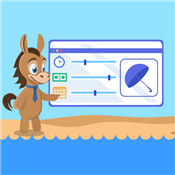Permanent Life Insurance
Permanent insurance offers lifelong life insurance coverage with real cash value. But are the high premiums worth it? Read on to find out.
 |
| © CreditDonkey |
- What Is Permanent Life Insurance?
- Types of Permanent Life Insurance
- What Are the Pros of Permanent Life Insurance?
- What Are the Cons of Permanent Life Insurance?
- What Does Cash Value Mean?
- Term vs Permanent Life Insurance
- Cost of Permanent Life Insurance
- Should You Choose a Term or Permanent Policy?
- What Is the Underwriting Process Like?
What is Permanent Life Insurance?
Permanent life insurance policies provide a guaranteed death benefit. No matter when you pass away, your beneficiaries will receive the death benefit payout as long as you stayed up to date on your premiums.
Some permanent life coverage also has an investment component in which the insurance company invests portions of your premiums. You'll earn a return on that investment that you can borrow against.
Permanent life policies cost more than other kinds of life insurance, like term coverage. But you may want to consider one of these options if you are looking for lifelong coverage.
- Are you interested in a life insurance policy that can grow in cash value, or has an investment component?
- Do you want a policy in place to leave an inheritance for beneficiaries?
- Do you want to provide financial support for estate taxes once you're gone?
- Are you planning on spending your retirement savings, but still want to provide a financial safety net for funeral and other end-of-life expenses?
- Do you have a child with a disability who will need lifelong financial support?
If you answered yes to any of these questions, a permanent life insurance policy may be right for you. Read on to learn the types of permanent life insurance policies.
Types of Permanent Life Insurance
Whole Life
Lifelong coverage with a cash value component and guaranteed death benefit. Typically the cash value amount is capped when you reach age 100.
Because of all of these feature, premiums are tipically higher for whole life than other policies.
| Premiums | Cash Value Growth |
|---|---|
|
|
Universal Life
Offers flexibility in premium payments, death benefits, and savings. Part of the premium payments goes to the cash value account and earns interest--and the cash value is tax deferred.
| Premiums | Cash Value Growth |
|---|---|
|
|
Variable Life
Part of premium payments goes to the cash value account. Cash value can be invested in different accounts, similar to mutual funds. You can choose how the dollars are invested (stocks, bonds, equity funds, etc).
| Premiums | Cash Value Growth |
|---|---|
|
|
Indexed Universal Life
Allows policyholder to allocate cash value amounts to either a fixed account or an equity index account. Policies offer a variety of indexes, such as NASDAQ 100. Index gains are credited back to the policy's cash value.
| Premiums | Cash Value Growth |
|---|---|
|
|
Variable Universal Life
Similar to Whole and Universal, except it includes an actual investment component, which grows cash value. There's no age in which the cash value equals the death benefit amount. No minimum cash value guarantees.
| Premiums | Cash Value Growth |
|---|---|
|
|
Guaranteed Universal Life
Guaranteed coverage without a medical exam. Often considered a last resort because of high premiums, but a good option if you want permanent coverage without investment components.
| Premiums | Cash Value Growth |
|---|---|
|
|
Generally, these policies are designated solely to pay for a funeral and other end-of-life expenses. They do not require a medical exam, so the insurance company is taking on a significant amount of risk. That's why they charge higher premiums.
To learn more about final expense insurance, read our article here.
What Are the Pros of Permanent Life Insurance?
Guaranteed Death Benefit
Your beneficiary will receive the death benefit no matter when you die, as long as you've stayed current on your premium payments.
More Flexible Premiums
With permanent life insurance policies like Whole and Guaranteed Issue policies, you will have fixed premiums. That means they won't change month-to-month for the life of the policy.
For other permanent policies, maximum and minimum levels are set and you can pay any amount in between.
Opportunity for Investment Returns
Most policies have a minimum return of investment. Whether the insurer is investing the dollars for you, as with Universal life, or you are investing yourself based on options offered by the insurer, you will likely see a small return.
Access to Cash Value
You can make withdrawals or borrow against the value of your policy in the form of a tax-free loan. These funds can be allocated to retirement, emergency funds, or other bills (more on this below).
If you surrender the policy (aka stop paying premiums), any accumulated cash value will be returned to you.
What Are the Cons of Permanent Life Insurance?
More Expensive
You could pay more than 10 times more for a permanent policy vs a term policy. The insurance company takes on more risk because of the guaranteed payout, cash value, and investment components. So you'll pay more in premiums.
Slow Return on Investment
Low interest rates mean it could be more than 10 years before you see a return on your investment. If you invested on your own, you could see immediate and greater return.
Complicated Policies
It may be challenging to understand the investment components, what your return will be, and cash value growth and limits.
What Does Cash Value Mean?
Each month, when you pay your permanent life premium, a small percentage will go into a cash value account overseen by the insurance company. The account grows at a small rate, depending on the policy and insurer.
Cash value grows tax-deferred, meaning you won't pay taxes. There are also no income taxes unless the amount of cash value is greater than the amount you've paid in premiums.
Using the Cash Value
Once your cash value has reached a certain amount, you are able to borrow against it via a loan or withdrawal.
When you take out a loan against your cash value account, you don't need to go through credit checks or additional qualifications. You also don't have to pay back the loan within a certain period of time, like traditional loans. This is because the insurer holds the money that covers the loan.
But you will be charged interest on the loan. Keep in mind that if your loan and unpaid interest exceeds the cash value amount, your policy will lapse and you will lose coverage.
If you die before the loan is paid off, the total amount of the loan will be deducted from the death benefit, and your beneficiary will not receive that amount.
With certain permanent policies, particularly Universal Life, you can pay your monthly premiums with the cash value. As the cash value account grows, you can use the earned dollars to pay the premiums so you don't have to.
If you use your cash value to pay for premiums, make sure the cash value doesn't reach $0, or the policy will lapse.
Term vs Permanent Life Insurance
Term life is another popular life insurance option. While both term and permanent coverages have similarities like fixed premium options, there are several differences.
With a term policy, your beneficiary receives the full death benefit should you die within the years of the term.
The main benefit to term life is you will have coverage when you need it. Common reasons people opt for term life insurance are to pay for:
- Raising children
- Mortgage payments
- Income replacement for a spouse
- College education
- Student loans, auto loans, credit card debt
- End-of-life medical costs
- Funeral expenses
Here's what else you should know:
- Term life insurance is cheaper than permanent policy options.
- Term policies are temporary, offering terms of 10, 20 and 30 years, though some companies offer 5-, 15- and 25-year terms.
- Permanent life insurance offers a cash value/investment component—term does not.
Cost of Permanent Life Insurance
With permanent policies, you have different options for how long you want to pay premiums.
- For your entire lifetime, either monthly or annually.
- For a certain number of years (after which you will let the policy lapse).
- Until you reach a certain age (after which you will let the policy lapse).
- In one lump sum, full payment.
It could be difficult to pay one lump sum or even make annual payments. Some permanent policies have fixed premiums but some do not. So the premiums could change on a month-by-month basis.
Should You Choose a Term or Permanent Policy?
In most scenarios, term life insurance is sufficient. However, permanent coverage may be beneficial in a few scenarios.
Choose Term Life If
- You only need life insurance to replace your income for a certain period of time, such as when you are raising children or paying off debts.
- You want an easier, more affordable coverage.
- You want a policy with a fixed premium.
- You do not need a cash value or investment component.
Choose Permanent Life If
- You want to provide an inheritance for beneficiaries, or money to your heirs for estate taxes. (Without the death benefit, your beneficiaries might have to sell parts of your estate to pay bills.)
- You have a lifelong dependent, such as a child with special needs.
- You want to spend your retirement savings but still leave something for beneficiaries to help with final expenses, funeral costs, etc.
- You want a policy with a cash value and/or investment component.
- You can afford larger premiums.
Combining Term and Permanent Insurance
You also have some options for combining both term and permanent policies.
- Permanent Life Insurance with a Term Rider
A term rider would add additional coverage to your permanent policy during certain years (or term) when you have greater financial needs, such as raising children or paying off student loans.This is not available on all permanent policies. Check with the life insurance company to learn if it's an option.
- Permanent Life Insurance + Term Life Insurance
These policies allow you to increase your coverage total when you need it for a larger combined death benefit. This would be cheaper than having a larger permanent policy, but you would be making payments on two separate policies. - Convertible Term Life Insurance
When you purchase a term policy, you must determine what your needs will be in 10, 15, 20, or even 30 years. Will your children be grown and no longer need financial support? Will all your debts be paid off? Will you have enough savings for a funeral?With a convertible term life policy, when the term is up, you can convert the policy to a permanent policy for the remainder of your life or however long you wish to continue paying premiums.
What Is the Underwriting Process Like?
The application process varies by company, but is generally similar. Keep reading to learn more.
Non-Medical Exam Policy Process
- Answering general questions online about you, your health, and your coverage wants and needs.
- The company will decide whether to insure you or not.
- Coverage is obtained within 24-48 hours of approval.
Medically Underwritten Policy Process
- Answer general questions online about you, your health, and your coverage wants and needs.
- Schedule and participate in a medical exam.
- The results will be sent to the insurer.
- The insurance company will analyze the results and decide whether to insure you.
- Your monthly premium will be determined.
When your policy is approved, you'll be notified and receive a full copy. Typically you'll also be asked to make the first premium payment. Be sure to make payments on time every month to avoid a lapse in coverage.
Bottom Line
The benefits to permanent life insurance, such as the guaranteed death benefit, cash value, investment components, and lifelong coverage, could make a policy worthwhile.
There are several different permanent life options. Talk with an independent life insurance agent to learn what coverage is best for your goals and financial situation.
Write to Caitlyn Callahan at feedback@creditdonkey.com. Follow us on Twitter and Facebook for our latest posts.
Note: This website is made possible through financial relationships with some of the products and services mentioned on this site. We may receive compensation if you shop through links in our content. You do not have to use our links, but you help support CreditDonkey if you do.
|
|
| ||||||
|
|
|












